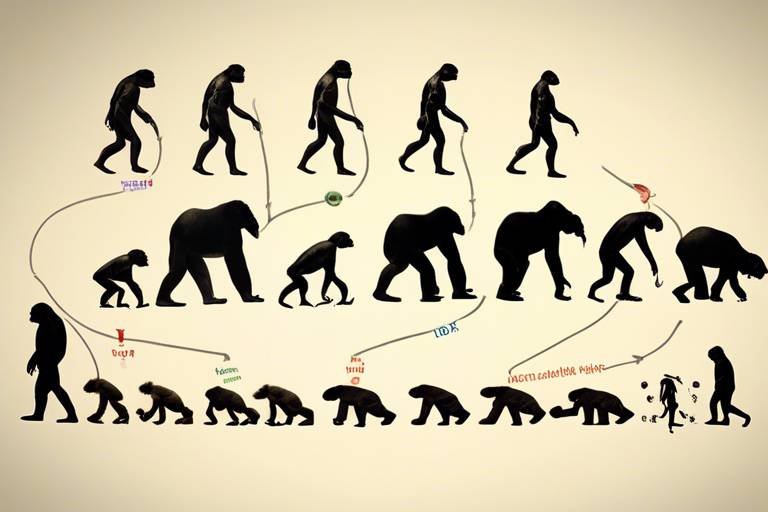Objectivity in Science - A Philosophical Review
In the vast realm of scientific inquiry, the notion of objectivity stands as a cornerstone of credibility and reliability. But what does it truly mean to be objective in science? This article aims to peel back the layers of this complex concept, exploring its philosophical implications, challenges, and its pivotal role in shaping scientific knowledge. The journey through the landscape of objectivity is not just a stroll; it's more like navigating a maze filled with intriguing twists and turns. So, buckle up as we delve into the essence of objectivity in science!
Understanding what objectivity means in the context of science is crucial. At its core, objectivity refers to the practice of perceiving and interpreting phenomena without personal biases or subjective influences. In scientific discourse, this concept is vital because it underpins the integrity of research findings. But how do we define objectivity? Here are a few interpretations:
- Neutral Observation: The idea that scientists should observe and report findings without letting personal feelings cloud their judgment.
- Universal Validity: The belief that scientific truths should hold regardless of individual perspectives or cultural contexts.
- Reproducibility: The principle that experiments and their results should be replicable by others, ensuring consistency and reliability.
Each of these interpretations highlights the significance of objectivity in scientific practice, emphasizing its role in fostering trust and credibility in scientific knowledge.
The historical development of the concept of objectivity in science reveals a rich tapestry woven with various philosophical movements and influential figures. Understanding this evolution can provide context for today’s discussions on objectivity. In the early days of scientific thought, philosophers like Aristotle and Galileo laid the groundwork for objective observation. They emphasized the importance of empirical evidence and rational thought in the pursuit of knowledge.
Exploring early philosophical thoughts on objectivity, we find that many influential philosophers contributed to the idea of unbiased observation. For instance, Descartes championed rationalism, advocating for a systematic approach to knowledge that relied on reason as a guiding principle. In contrast, Locke and other empiricists argued that experience and sensory perception were the primary sources of knowledge. This debate between rationalism and empiricism has significant implications for our understanding of objectivity in science.
The clash between rationalism and empiricism can be likened to two sides of a coin. Rationalists believe that reason is the key to unlocking the mysteries of the universe, while empiricists argue that observation and experience are essential. This ongoing debate raises a critical question: can we ever achieve true objectivity if our understanding of the world is filtered through our individual experiences?
Another significant philosophical movement that has shaped scientific objectivity is positivism. This school of thought advocates for a strictly empirical approach to knowledge, asserting that only observable phenomena should be considered valid. Positivism has had a profound impact on modern scientific practices, emphasizing the need for data-driven conclusions and reproducible results. However, this focus on observable data can sometimes overlook the nuanced, subjective aspects of scientific inquiry.
Today, objectivity faces numerous challenges, including biases and cultural influences that can seep into scientific research. In a world where personal beliefs and societal norms can shape perceptions, maintaining objectivity is more challenging than ever. For instance, consider the impact of funding sources on research outcomes. When studies are financed by organizations with vested interests, the potential for bias increases, leading to questions about the validity of the findings.
As we peel back the layers of objectivity, we must also confront the role of subjectivity in scientific inquiry. Can we ever achieve complete objectivity? This question has sparked debates among scholars and scientists alike. Personal perspectives, experiences, and biases inevitably influence research outcomes, raising concerns about the integrity of scientific knowledge.
Values play a critical role in shaping scientific inquiry. Ethical, social, and political values can inform research questions, methodologies, and interpretations. For instance, consider how societal values influence the funding and focus of scientific research. Are we prioritizing studies that address pressing social issues, or are we driven by commercial interests? These questions highlight the intricate relationship between values and objectivity in science.
Analyzing real-world examples of bias in scientific research can illustrate the complexities of maintaining objectivity. For instance, studies on climate change have often faced scrutiny regarding their objectivity, with critics pointing to potential biases in data interpretation and funding sources. Such case studies serve as reminders that objectivity is not merely a goal but a continuous challenge in the scientific process.
Looking ahead, there are potential pathways for enhancing objectivity in scientific research. One promising approach is the integration of interdisciplinary perspectives, which can provide a more comprehensive understanding of complex issues. By embracing diverse viewpoints, scientists can mitigate biases and enrich their research. Furthermore, fostering a culture of transparency and open dialogue can help address concerns about objectivity, encouraging collaboration and critical examination of findings.
- What is the main challenge to achieving objectivity in science?
Biases, funding influences, and cultural perspectives can all challenge the pursuit of objectivity in scientific inquiry. - Can subjectivity ever be eliminated from scientific research?
While complete objectivity may be unattainable, acknowledging and addressing subjectivity can enhance the integrity of scientific work. - How can interdisciplinary approaches improve scientific objectivity?
By integrating diverse perspectives, researchers can gain a more holistic understanding of complex issues and reduce biases.

The Definition of Objectivity
Understanding what objectivity means in the context of science is crucial for anyone delving into the world of scientific inquiry. At its core, objectivity refers to the practice of making observations and conclusions based on facts and evidence, free from personal biases, emotions, or subjective interpretations. It’s like trying to look at a painting without letting your personal feelings about the artist influence your view of the artwork. In science, this means striving for a clear lens through which to observe natural phenomena.
There are several interpretations of objectivity, each emphasizing different aspects of the scientific process. For instance, some scholars argue that objectivity is primarily about the methods used in research—emphasizing standardized procedures that can be replicated by others. Others contend that it is more about the mindset of the researcher, advocating for a rigorous self-awareness of one’s biases and the impact they may have on data interpretation. Understanding these nuances is essential for grasping the broader implications of objectivity in scientific discourse.
Moreover, the significance of objectivity extends beyond mere definitions; it plays a pivotal role in the credibility and reliability of scientific findings. When scientists aim for objectivity, they enhance the trustworthiness of their results. This is particularly important in a world where misinformation can spread like wildfire. A scientific claim backed by objective evidence is far more likely to withstand scrutiny and contribute to the body of knowledge. In fact, the very foundation of the scientific method is built upon the principles of objectivity, which is why it is often regarded as a hallmark of scientific integrity.
To further illustrate the concept, consider the following table that outlines key characteristics of objectivity in science:
| Characteristic | Description |
|---|---|
| Unbiased Observation | Observations are made without personal feelings or preconceived notions affecting the outcome. |
| Replicability | Experiments and studies can be repeated by others, yielding the same results. |
| Evidence-Based | Conclusions are drawn from solid evidence rather than personal beliefs or anecdotal experiences. |
| Transparency | Research methods and data are openly shared, allowing others to evaluate and critique them. |
In conclusion, objectivity in science is not just a lofty ideal; it’s a fundamental necessity that underpins the credibility of scientific inquiry. As we navigate through the complexities of scientific research, embracing objectivity can help us to uncover truths about the world around us, free from the distortions of personal biases and subjective interpretations. This quest for objectivity is not merely about achieving a sterile detachment from our work but rather about cultivating a disciplined approach to knowledge that is both rigorous and open-minded.

The Historical Context
Understanding the historical context of objectivity in science is like peeling back the layers of an onion; each layer reveals a deeper insight into how our perceptions of unbiased observation have evolved over centuries. The journey begins in ancient Greece, where philosophers like Aristotle laid the groundwork for empirical observation. Aristotle’s emphasis on systematic observation and classification of the natural world set the stage for future scientific inquiry, advocating for a methodical approach to understanding phenomena.
As we move through history, the Renaissance period marks a significant shift. Think of it as a rebirth of knowledge, where figures like Galileo Galilei challenged traditional views with his insistence on observation and experimentation. Galileo’s use of the telescope not only expanded our understanding of the cosmos but also highlighted the importance of empirical evidence as a cornerstone of scientific inquiry. His work exemplifies the transition from reliance on ancient texts to the importance of observation in establishing facts.
Fast forward to the 17th and 18th centuries, the Enlightenment era brought forth the clash of ideas between Rationalism and Empiricism. Rationalists, like Descartes, argued that knowledge could be derived from reason alone, while empiricists, such as Locke and Hume, posited that knowledge comes from sensory experience. This debate significantly influenced the notion of objectivity, as each camp offered contrasting views on how we can achieve unbiased knowledge. The tension between these perspectives is akin to a tug-of-war, with each side pulling at the fabric of scientific methodology.
In the 19th century, the rise of Positivism, championed by thinkers like Auguste Comte, further solidified the notion of objectivity in science. Positivism argued that only observable phenomena should be the basis for knowledge, effectively sidelining metaphysical speculation. This philosophy not only shaped scientific practices but also influenced social sciences, emphasizing that facts must be verifiable through observation and experimentation. The impact of Positivism can be summarized in the following table:
| Philosopher | Contribution | Impact on Objectivity |
|---|---|---|
| Aristotle | Systematic observation | Foundation for empirical methods |
| Galileo Galilei | Use of the telescope | Emphasis on empirical evidence |
| Rene Descartes | Rationalism | Knowledge from reason |
| Auguste Comte | Positivism | Observable phenomena as the basis for knowledge |
As we delve into the 20th century, the discussion around objectivity becomes increasingly complex. The advent of social constructivism and the recognition of the role of values in science introduced new challenges. No longer could scientists claim to be completely objective; cultural, social, and ethical values began to seep into the fabric of scientific inquiry. This shift is akin to adding colors to a black-and-white photograph, revealing a spectrum of influences that shape our understanding of objectivity.
In summary, the historical context of objectivity in science is a rich tapestry woven from the contributions of various philosophers and movements. From the early empirical observations of Aristotle to the rigorous standards set by Positivism, our understanding of what it means to be objective has undergone significant transformation. Each philosophical shift has added a new layer to our comprehension, challenging us to reconsider how we approach scientific inquiry today.
- What is objectivity in science? Objectivity in science refers to the practice of observing and interpreting phenomena without personal biases or subjective influences.
- Why is the historical context important? The historical context helps us understand how the concept of objectivity has evolved over time and the influences that have shaped scientific practices.
- How do values affect scientific research? Values can influence the questions scientists ask, the methods they use, and how they interpret their findings, making complete objectivity challenging.

Early Philosophical Perspectives
The roots of objectivity in science can be traced back to early philosophical thought, where influential thinkers laid the groundwork for understanding unbiased observation and knowledge. In this rich tapestry of ideas, philosophers like Aristotle, Descartes, and Hume played pivotal roles in shaping the discourse around objectivity. Each of these figures contributed unique perspectives that continue to resonate in modern scientific inquiry.
Aristotle, often regarded as the father of empirical observation, emphasized the importance of experience and observation in acquiring knowledge. He believed that knowledge begins with sensory experiences, which are then processed through reason. This approach laid the foundation for later empirical methods, suggesting that objectivity could be achieved through careful observation and systematic inquiry. In contrast, René Descartes championed rationalism, arguing for the primacy of reason as the path to knowledge. His famous dictum, "Cogito, ergo sum" (I think, therefore I am), underscored his belief that true knowledge must be derived from rational thought rather than sensory experience alone.
However, the tension between these two perspectives—rationalism and empiricism—raises questions about the nature of objectivity. Can we ever be truly objective if our observations are filtered through our senses? This philosophical debate is crucial, as it highlights the complexities involved in achieving a completely unbiased perspective in scientific inquiry.
Another significant figure, David Hume, introduced skepticism into the conversation about objectivity. Hume questioned whether we could ever truly know anything with certainty, arguing that our understanding is always mediated by our experiences and perceptions. This skepticism serves as a reminder that while striving for objectivity, scientists must also acknowledge the limitations of human perception and the potential for bias in their observations.
As we reflect on these early philosophical perspectives, it becomes clear that the quest for objectivity in science is not merely a modern concern but a longstanding philosophical challenge. The interplay between experience, reason, and skepticism continues to shape our understanding of what it means to be objective in scientific inquiry.
In summary, the early philosophical perspectives on objectivity reveal a complex landscape where different schools of thought converge and diverge. Understanding these foundational ideas is essential for grappling with the challenges of objectivity in contemporary science, as they remind us that the pursuit of knowledge is as much about the questions we ask as the answers we seek.
- What is objectivity in science? Objectivity in science refers to the practice of observing and interpreting data without personal biases, ensuring that findings are based on factual evidence.
- Who were the key philosophers that influenced the concept of objectivity? Key philosophers include Aristotle, who emphasized empirical observation; Descartes, who championed rationalism; and Hume, who introduced skepticism about certainty.
- Can complete objectivity be achieved in scientific research? While scientists strive for objectivity, complete objectivity may be unattainable due to inherent human biases and the subjective nature of interpretation.
- How do values influence scientific inquiry? Ethical, social, and political values can shape research questions, methodologies, and interpretations, impacting the perceived objectivity of scientific findings.

Rationalism vs. Empiricism
When we think about the quest for knowledge, two philosophical giants often come to mind: Rationalism and Empiricism. These schools of thought represent fundamentally different approaches to understanding the world, especially in the realm of science. Rationalists argue that reason and innate ideas are the primary sources of knowledge, while empiricists maintain that our understanding is rooted in sensory experience. This debate is not just academic; it has profound implications for how we interpret scientific data and strive for objectivity.
To put it simply, rationalists believe that we can arrive at certain truths through logical deduction and reasoning alone. Think of it like building a house: if you have a solid blueprint (your reasoning), you can construct a sturdy structure without needing to constantly check the materials against the outside world. In contrast, empiricists liken scientific inquiry to a treasure hunt, where each piece of evidence collected through observation and experimentation adds to our understanding. They argue that without these sensory experiences, our knowledge remains incomplete and potentially flawed.
The tension between these two views can be illustrated through a few key points:
- Source of Knowledge: Rationalists trust in the power of reason, while empiricists champion observation.
- Role of Experience: For rationalists, experience is secondary; for empiricists, it's essential.
- Scientific Method: Rationalism leans towards hypothesis-driven research, whereas empiricism emphasizes data collection and analysis.
This philosophical tug-of-war doesn't just stay within the confines of theoretical discussion; it seeps into the very fabric of scientific practice. For instance, in fields like physics, rationalist approaches may lead to the development of theories that are later tested through empirical observation. On the other hand, in the social sciences, where human behavior is the subject of study, empiricism often reigns supreme, as researchers rely heavily on surveys and experiments to gather data.
However, the debate doesn't end there. Many contemporary philosophers and scientists argue for a synthesis of these two approaches, recognizing that both reason and experience contribute to a more comprehensive understanding of reality. This blend can lead to a more robust scientific inquiry, where hypotheses are not only derived from logical reasoning but also tested against the rich tapestry of human experience.
In conclusion, the clash between rationalism and empiricism continues to shape our understanding of objectivity in science. As we navigate the complexities of knowledge production, it becomes essential to acknowledge the strengths and limitations of both perspectives. By doing so, we can aim for a more balanced approach that embraces the rigor of rational thought while remaining grounded in the realities of empirical evidence.

Positivism and Its Impact
Positivism, as a philosophical doctrine, emerged in the early 19th century, primarily through the works of Auguste Comte. This movement fundamentally reshaped the landscape of scientific inquiry by advocating for a methodology grounded in observable phenomena. In essence, positivism posits that knowledge should be derived from empirical evidence and that the only authentic knowledge is that which is based on sense experience. This approach has significantly influenced how science is conducted and perceived, pushing aside metaphysical speculation in favor of rigorous experimentation and observation.
The impact of positivism on scientific practices can be seen in several key areas:
- Emphasis on Empirical Data: Positivism stresses the importance of collecting data through observation and experimentation. This focus has led to the development of the scientific method, which relies heavily on measurable and observable outcomes.
- Rejection of Speculation: By dismissing metaphysical and abstract theories, positivism encourages scientists to focus on what can be quantified, thereby narrowing the scope of scientific inquiry to the tangible and verifiable.
- Standardization of Scientific Practices: Positivism has contributed to the establishment of standardized methods and practices in scientific research, fostering a more uniform approach to data collection and analysis across various disciplines.
However, while positivism has undeniably advanced the rigor of scientific inquiry, it has also faced criticism for its limitations. Critics argue that by prioritizing observable phenomena, positivism may overlook the subjective aspects of human experience that can also inform scientific understanding. For instance, the emotional and ethical dimensions of scientific research often go unexamined under a strictly positivist framework. This raises an important question: can we truly achieve a complete understanding of the world if we ignore the subjective elements that shape our experiences?
Furthermore, the rise of positivism has led to the emergence of various scientific disciplines that rely heavily on quantitative research methods, sometimes at the expense of qualitative insights. Fields such as psychology, sociology, and even economics have been influenced by positivist ideals, which can create a dichotomy between qualitative and quantitative research approaches. This division can hinder a more holistic understanding of complex phenomena, suggesting that a balance between the two methodologies might be necessary for comprehensive scientific inquiry.
In conclusion, while positivism has played a pivotal role in shaping modern science by promoting a rigorous, evidence-based approach, it is crucial to recognize its limitations. As we continue to explore the frontiers of knowledge, a more integrative approach that considers both empirical data and subjective experiences may offer a richer understanding of the complexities of the world around us.
- What is positivism? Positivism is a philosophical approach that emphasizes the importance of observable phenomena and empirical evidence in the acquisition of knowledge.
- How has positivism influenced scientific research? It has led to the development of the scientific method, promoting rigorous data collection and analysis while rejecting metaphysical speculation.
- What are the limitations of positivism? Critics argue that it may overlook subjective experiences and qualitative insights, which are also important for a complete understanding of complex phenomena.

Contemporary Challenges to Objectivity
In the ever-evolving landscape of scientific inquiry, the notion of objectivity is increasingly put to the test. With the rise of interdisciplinary research and the integration of diverse methodologies, scientists are confronted with a myriad of challenges that threaten the ideal of unbiased observation. One of the most significant contemporary challenges is the presence of cognitive biases, which can subtly influence researchers' interpretations and conclusions. These biases often stem from personal beliefs, cultural backgrounds, and even the prevailing societal narratives that shape our understanding of the world.
Moreover, the increasing complexity of scientific problems means that collaboration across various fields is more common than ever. While this can enrich research, it also introduces potential conflicts in methodological approaches and theoretical frameworks. For instance, a biologist and a sociologist might interpret the same data in vastly different ways due to their distinct disciplinary lenses. This divergence raises questions about the reliability of findings that claim to be objective.
Another pressing issue is the impact of funding sources on research outcomes. Studies have shown that the interests of funding bodies can influence research agendas and the dissemination of results. For example, research sponsored by pharmaceutical companies may prioritize positive outcomes that favor their products, thereby casting a shadow over the objectivity of the findings. This phenomenon highlights the importance of transparency and accountability in scientific funding, as well as the need for rigorous peer review to mitigate potential biases.
Additionally, the role of social media in shaping public perception of science cannot be overlooked. The rapid dissemination of information, often without thorough vetting, can lead to the spread of misinformation. This not only affects public trust in scientific findings but also pressures scientists to conform to popular opinions rather than adhere strictly to empirical evidence. The challenge lies in maintaining a balance between engaging with the public and upholding the integrity of scientific discourse.
To illustrate these challenges, consider the following table that summarizes key contemporary issues affecting objectivity in science:
| Challenge | Description |
|---|---|
| Cognitive Biases | Personal beliefs and cultural backgrounds influencing research outcomes. |
| Interdisciplinary Conflicts | Divergent interpretations of data based on different disciplinary perspectives. |
| Funding Influences | Research agendas shaped by the interests of funding bodies. |
| Social Media Impact | The spread of misinformation affecting public trust and scientific integrity. |
In conclusion, while the pursuit of objectivity remains a cornerstone of scientific inquiry, it is essential to recognize and address the contemporary challenges that threaten its realization. By fostering an environment of critical reflection and embracing diverse perspectives, the scientific community can strive towards a more nuanced understanding of objectivity that acknowledges its complexities and limitations.
- What is objectivity in science? Objectivity in science refers to the practice of making observations and interpretations that are free from personal biases and subjective influences.
- Why is objectivity important? Objectivity is crucial for ensuring that scientific findings are credible, reliable, and can be replicated by others in the field.
- What are some examples of cognitive biases in research? Examples include confirmation bias, where researchers favor information that confirms their pre-existing beliefs, and publication bias, where studies with positive results are more likely to be published.
- How can scientists maintain objectivity? Scientists can maintain objectivity by being aware of their biases, seeking peer reviews, and ensuring transparency in their research methods and funding sources.

Subjectivity in Scientific Inquiry
When we think about science, we often picture a world of cold, hard facts—an arena where objectivity reigns supreme. However, the reality is much more nuanced. Subjectivity plays a crucial role in scientific inquiry, and understanding this role is essential for grasping the complexities of how knowledge is produced. So, is complete objectivity even achievable? This question lingers like a shadow over the scientific community, challenging the notion that our findings are purely based on observable facts.
At its core, science is a human endeavor. Scientists are not robots; they bring their own experiences, beliefs, and biases into their work. This inherent subjectivity can shape everything from the questions researchers choose to ask to how they interpret their data. For instance, consider a scientist studying climate change. Their personal beliefs about environmental policy may influence how they frame their research questions or the significance they attribute to certain findings. This leads us to wonder: can we ever truly separate our personal views from our scientific work?
Moreover, the values that scientists hold can significantly impact their research. Ethical, social, and political values often inform the direction of scientific inquiry. For example, in medical research, the prioritization of certain diseases over others can reflect societal values. If a particular condition is seen as more pressing due to media coverage or public concern, researchers may focus their efforts there, potentially neglecting less visible but equally important health issues. This interplay between values and research priorities illustrates how subjectivity can influence the scientific landscape.
To further understand the implications of subjectivity in scientific inquiry, let’s consider a few key examples:
- Gender Bias in Medical Research: Historically, many clinical trials have excluded women, leading to a lack of understanding of how certain treatments affect them. This oversight reflects a subjectivity that has persisted in the scientific community, often based on outdated notions about gender.
- Cultural Perspectives in Anthropology: Anthropologists often bring their cultural backgrounds into their research, which can influence their interpretations of the communities they study. This subjectivity can enrich the field but also raises questions about bias in representing those cultures.
- Confirmation Bias in Data Interpretation: Scientists may unintentionally favor data that supports their hypotheses while disregarding contradictory evidence. This cognitive bias is a classic example of how subjectivity can taint the purity of scientific inquiry.
The reality is, while scientists strive for objectivity, they are ultimately influenced by their contexts. The challenge lies in acknowledging this subjectivity and finding ways to mitigate its effects. One potential pathway is through the adoption of interdisciplinary approaches, which can bring together diverse perspectives and methodologies. By collaborating across fields, scientists can create a more holistic view of complex issues, reducing the risk of personal biases overshadowing the data.
In conclusion, recognizing the role of subjectivity in scientific inquiry is not about throwing out the concept of objectivity altogether; rather, it’s about understanding the delicate balance between the two. By embracing this complexity, we can enhance the rigor of scientific research and foster a more inclusive and reflective scientific community.
- What is the difference between objectivity and subjectivity in science?
Objectivity refers to the practice of relying on observable phenomena and facts, while subjectivity encompasses personal biases, beliefs, and values that can influence scientific inquiry. - Can science ever be completely objective?
While scientists strive for objectivity, complete objectivity is challenging due to the inherent biases and values that individuals bring to their work. - How can scientists reduce bias in their research?
Scientists can reduce bias by employing rigorous methodologies, collaborating with diverse teams, and being transparent about their values and potential conflicts of interest.

The Role of Values in Science
When we talk about science, we often envision a world of cold, hard facts and unyielding data. However, the reality is much more nuanced. Values play a significant role in shaping scientific inquiry, influencing everything from the questions researchers choose to ask, to the methodologies they employ, and even the interpretations they make. But what exactly do we mean by "values" in this context? Are we talking about ethical considerations, social responsibilities, or perhaps political agendas? The answer is yes to all of these, and understanding their impact is crucial for a complete picture of scientific objectivity.
Values act as a lens through which scientists view their work. For instance, when a researcher decides to study climate change, their personal values regarding environmental conservation might drive their focus on specific aspects of the issue, such as the effects on biodiversity or human health. This choice can lead to a more comprehensive understanding of the problem, but it also raises questions about bias. Are they prioritizing certain outcomes over others? In this way, values can both enrich and complicate the scientific process.
Moreover, the influence of values extends beyond individual scientists. Institutional values—those held by research organizations, funding bodies, and even governments—can dictate the direction of scientific research. For instance, if a government prioritizes technological advancement for economic growth, researchers may find themselves under pressure to align their studies with these objectives, potentially sidelining other important areas of inquiry. This dynamic can create a tension where the pursuit of knowledge is interwoven with the pursuit of funding and political favor, challenging the ideal of pure objectivity.
To illustrate this point further, consider the following table that outlines how different values can shape scientific inquiry:
| Value Type | Impact on Science |
|---|---|
| Ethical Values | Guides the moral implications of research, affecting areas like medical ethics and animal rights. |
| Social Values | Influences the relevance of research questions, often reflecting societal needs and concerns. |
| Political Values | Affects funding priorities and research agendas, potentially leading to biased outcomes. |
In addition to these institutional influences, the cultural context in which research is conducted cannot be overlooked. Different cultures may prioritize various aspects of knowledge and inquiry, leading to diverse scientific practices around the globe. For example, Indigenous knowledge systems often emphasize a holistic understanding of nature, which can contrast sharply with Western scientific methods that typically favor reductionist approaches. This cultural divergence highlights how values are not merely personal but are deeply embedded in the fabric of scientific communities.
Ultimately, while striving for objectivity is a noble goal in science, it is essential to recognize that values are an inseparable part of the scientific process. They shape the questions we ask, the methodologies we employ, and the interpretations we make. Thus, a more nuanced understanding of objectivity must account for the dynamic interplay between values and scientific inquiry. Embracing this complexity can lead to richer, more responsible science that acknowledges its social dimensions while still aspiring to uncover the truths of our world.
- What are the main values influencing scientific research?
Ethical, social, and political values significantly influence scientific research, affecting everything from research questions to funding priorities.
- Can science ever be completely objective?
While scientists strive for objectivity, personal and cultural values inevitably play a role, making complete objectivity challenging to achieve.
- How can values enhance scientific inquiry?
Values can guide researchers to focus on relevant issues, ensuring that scientific inquiry addresses societal needs and ethical considerations.

Case Studies of Bias in Research
When we think of scientific research, we often picture a pristine laboratory, sterile instruments, and a researcher in a white coat, diligently working to uncover the mysteries of the universe. However, the reality is that biases can creep into research in subtle and insidious ways. Understanding these biases is crucial, as they can significantly impact the validity of scientific findings. Let's delve into some compelling case studies that illustrate how bias can manifest in research.
One of the most infamous examples of bias in research is the Wakefield study, published in 1998. This study falsely linked the MMR vaccine to autism, sparking a global health crisis and a significant decline in vaccination rates. The research was later found to be fraudulent, with serious ethical violations. This case highlights how personal beliefs and financial interests can lead to biased research outcomes, ultimately endangering public health. The fallout from this study serves as a reminder of the importance of transparency and accountability in scientific inquiry.
Another noteworthy case involves gender biases in clinical trials. Historically, women have been underrepresented in medical research, leading to a lack of understanding of how certain treatments affect them differently than men. For instance, a study published in the Journal of the American Medical Association revealed that many heart disease studies predominantly included male participants. This oversight can result in misdiagnosis and inadequate treatment for women, showcasing how biases—whether intentional or not—can have real-world consequences on health outcomes.
Additionally, racial and ethnic biases in research have been well-documented. A study conducted by the National Institutes of Health found that minority groups are often excluded from clinical trials, which skews the applicability of research findings to diverse populations. For example, the effectiveness of certain medications may vary significantly between different ethnic groups, yet the lack of representation can lead to one-size-fits-all treatment protocols that may not work for everyone. This raises critical questions about fairness and equity in healthcare, emphasizing the need for more inclusive research practices.
To further illustrate the complexities of bias in research, consider the following table, which summarizes key case studies and their implications:
| Case Study | Type of Bias | Implications |
|---|---|---|
| Wakefield Study (1998) | Financial and Ethical Bias | Increased vaccine hesitancy, public health crisis |
| Gender Bias in Clinical Trials | Gender Bias | Misdiagnosis and inadequate treatment for women |
| Racial and Ethnic Exclusion | Racial Bias | Lack of effective treatments for minority groups |
These case studies serve as a sobering reminder that bias can infiltrate even the most well-intentioned research. As we advance in our understanding of science, it is vital to remain vigilant about the potential for biases to distort our findings. By acknowledging these biases and actively working to mitigate them, we can enhance the integrity of scientific inquiry and ensure that research benefits all individuals, regardless of their background.
In conclusion, the journey towards objectivity in science is fraught with challenges, but awareness of bias is the first step in overcoming these obstacles. By learning from past mistakes and striving for inclusivity and transparency, we can pave the way for a more equitable and reliable scientific future.
- What is bias in scientific research? Bias in scientific research refers to systematic errors that can affect the validity of study findings, often stemming from personal beliefs, financial interests, or methodological flaws.
- How can bias be minimized in research? Bias can be minimized through rigorous peer review, diverse participant inclusion, and transparent reporting of methodologies and conflicts of interest.
- Why is objectivity important in science? Objectivity is crucial in science as it ensures that findings are based on factual evidence rather than personal beliefs, leading to reliable and valid conclusions.

Future Directions for Objectivity in Science
As we gaze into the crystal ball of scientific inquiry, it's clear that the quest for objectivity is far from over. In fact, the future of science may hinge on our ability to navigate the intricate web of biases, cultural influences, and personal perspectives that shape our understanding of the world. So, what does this future look like? Let’s explore some promising pathways that could enhance objectivity in scientific research.
One of the most exciting directions is the push towards interdisciplinary collaboration. By breaking down the silos between different fields of study, scientists can gain fresh insights and challenge their assumptions. Imagine a physicist working alongside a sociologist to examine the impact of climate change on communities. This blend of perspectives not only enriches the research but also helps to mitigate individual biases that might color the findings. As the saying goes, "two heads are better than one," and this couldn't be truer in the realm of science.
Additionally, the integration of diverse perspectives is becoming increasingly vital. This means not just including voices from different disciplines but also ensuring representation from various cultural, social, and gender backgrounds. When research teams reflect a broader spectrum of society, they are more likely to recognize and address biases that might otherwise go unnoticed. For instance, consider how a diverse team might approach a study on healthcare disparities; their varied experiences could lead to more comprehensive solutions.
Moreover, advancements in technology are paving the way for enhanced objectivity. With tools like machine learning and big data analytics, researchers can analyze vast amounts of information without the same level of human bias. These technologies can help uncover patterns and insights that might be overlooked by individual researchers. However, it’s crucial to remember that technology is not a panacea. The algorithms used must be scrutinized for their own biases, ensuring that they serve to enhance, rather than detract from, the quest for objectivity.
Finally, a commitment to ongoing education and training in ethics and bias awareness is essential. Scientists must be equipped with the tools to recognize their own biases and understand the ethical implications of their work. This could include workshops, seminars, or even mandatory courses on the philosophy of science. By fostering a culture of self-reflection and accountability, the scientific community can work towards a more objective understanding of the world.
In summary, the future of objectivity in science is bright, but it requires a concerted effort from all stakeholders involved. By embracing interdisciplinary collaboration, integrating diverse perspectives, leveraging technology, and committing to ongoing education, we can strive towards a more objective and inclusive scientific landscape. The road ahead may be challenging, but the potential rewards are immense, promising to enrich our understanding of the universe and our place within it.
- What is objectivity in science? Objectivity in science refers to the practice of conducting research and interpreting results without allowing personal biases, emotions, or subjective influences to distort the findings.
- Why is objectivity important? Objectivity is crucial because it ensures that scientific findings are reliable, replicable, and can be trusted to inform policy and practice.
- Can science ever be completely objective? While complete objectivity may be an ideal, many scientists argue that personal and cultural perspectives inevitably influence research. The goal is to minimize these biases as much as possible.
- How can we improve objectivity in scientific research? Improving objectivity can be achieved through interdisciplinary collaboration, diverse representation in research teams, the use of technology to analyze data, and ongoing education about bias and ethics.
Frequently Asked Questions
- What is objectivity in science?
Objectivity in science refers to the practice of maintaining impartiality and neutrality in scientific inquiry. It means that scientists strive to observe and report findings without letting personal biases, emotions, or subjective influences interfere. This concept is crucial for ensuring that scientific knowledge is reliable and universally applicable.
- Why is objectivity important in scientific research?
Objectivity is vital in scientific research because it helps ensure that results are credible and can be replicated. When scientists approach their work with objectivity, it minimizes the risk of errors due to personal biases, leading to more accurate conclusions. This reliability is essential for building trust in scientific findings among the public and the scientific community.
- How has the concept of objectivity evolved historically?
The concept of objectivity has evolved significantly over time. Early philosophical perspectives, like those of rationalism and empiricism, laid the groundwork for understanding unbiased observation. Movements such as positivism further shaped the notion of objectivity by emphasizing observable phenomena as the basis for knowledge. Over the years, various philosophers have contributed to refining this idea, making it a cornerstone of modern scientific practice.
- What are some contemporary challenges to objectivity?
Contemporary challenges to objectivity include biases that arise from cultural influences, personal beliefs, and social contexts. These factors can affect how research is conducted and interpreted. For example, funding sources or societal pressures may lead to unintentional biases in research outcomes, raising concerns about the true objectivity of scientific studies.
- Can complete objectivity be achieved in science?
While complete objectivity is an ideal goal, many argue that it may not be fully achievable due to inherent human subjectivity. Personal experiences, values, and perspectives inevitably shape how scientists observe and interpret data. However, striving for objectivity is still essential, as it encourages rigorous methodologies and critical thinking in scientific inquiry.
- How do values influence scientific inquiry?
Values play a significant role in shaping scientific inquiry. Ethical, social, and political values can inform the questions researchers choose to explore and how they interpret their findings. For instance, societal values may influence research priorities, funding, and even the communication of results, highlighting the complex interplay between objectivity and subjectivity in science.
- What are some examples of bias in scientific research?
There have been numerous instances of bias in scientific research, ranging from selective reporting of results to confirmation bias, where researchers only seek information that supports their hypotheses. Case studies have shown how these biases can lead to flawed conclusions, emphasizing the need for transparency and rigorous peer review processes to maintain objectivity.
- What future directions are there for enhancing objectivity in science?
Future directions for enhancing objectivity in science may include interdisciplinary approaches that integrate diverse perspectives and methodologies. Encouraging collaboration among scientists from various fields can help mitigate biases and foster a more comprehensive understanding of complex issues. Additionally, promoting transparency in research practices and encouraging open dialogue about values in science can further strengthen objectivity.



















